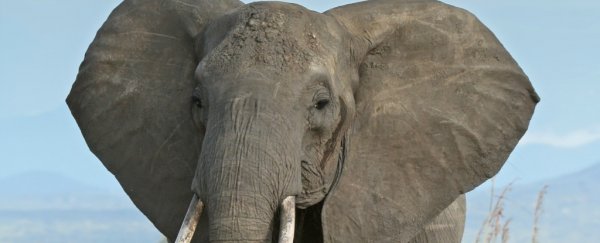An international team of researchers just announced the results of a gigantic, two-year elephant census, designed to count every savannah elephant in 18 different African countries to see how their populations have changed.
The census revealed that there are now roughly 352,271 African savannah elephants living in the included countries, which means that between 2007 and 2014, the population has declined by nearly a third.
"This was an extraordinary collaboration across borders, cultures, and jurisdictions. We completed a successful survey of massive scale, and what we learned is deeply disturbing," said philanthropist Paul Allen, who funded the study.
"Armed with this knowledge of dramatically declining elephant populations, we share a collective responsibility to take action and we must all work to ensure the preservation of this iconic species."
The project, called the Great Elephant Census (GEC), was led by an international team of researchers working together as part of the Elephants Without Borders (EWB) conservation group.
The EWB teamed up with over 90 different scientists from around the world to evaluate elephant populations in 18 African countries by flying over them with a fleet of 81 aeroplanes.
Flying some 463,000 kilometres (287,694 miles) in total, researchers took count of the elephants they observed while flying above, and data analysts kept tabs to ensure that none were counted more than once.
It might sound like a pretty basic technique, but the team says this is the most accurate and non-invasive way they have to establish population numbers.
In the past, individual countries were in charge of counting and reporting their elephant populations to the EWB. While this cuts the census cost down immensely, it's nearly impossible to gauge whether or not the findings are accurate, Rebecca Hersher reports for NPR.
In fact, before the new survey, some reports have estimated that there were over 600,000 savannah elephants - a figure that we now know is about 300,000 more than there actually are.
The team says they've counted at least 93 percent of all of the elephants, and estimate that there about 352,271 savannah elephants left in existence.
Compared to 2007, the results suggest a decline of about 30 percent, or 144,000 elephants.
This figure is largely the result of illegal poaching, the researchers say, with African poachers typically selling the ivory they illegally collect to Chinese markets. And it's proving almost impossible to stop these poachers, even if the elephants are on protected land.
"Eighty-four percent of the population surveyed was sighted in legally protected areas while 16 percent were in unprotected areas," the team said in a statement.
"However, high numbers of elephant carcasses were discovered in many protected areas, indicating that elephants are struggling both inside and outside parks."
It's hoped that these findings will push officials in the affected areas to come up with more effective measures to control poachers, and bring word of the plight of the savannah elephant to the public's attention.
The next step for the team is to perform a similar census for forest elephants to see how poaching is influencing their populations.
The results of the census were published in PeerJ.
